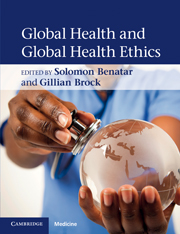Book contents
- Frontmatter
- Contents
- List of contributors
- Introduction
- Section 1 Global health, definitions and descriptions
- Section 2 Global health ethics, responsibilities and justice: some central issues
- Section 3 Analyzing some reasons for poor health
- 12 Trade and health: the ethics of global rights, regulation and redistribution
- 13 Debt, structural adjustment and health
- 14 The international arms trade and global health
- 15 Allocating resources in humanitarian medicine
- 16 International aid and global health
- 17 Climate change and health: risks and inequities
- 18 Animals, the environment and global health
- 19 The global crisis and global health
- Section 4 Shaping the future
- Index
- References
19 - The global crisis and global health
Published online by Cambridge University Press: 01 March 2011
- Frontmatter
- Contents
- List of contributors
- Introduction
- Section 1 Global health, definitions and descriptions
- Section 2 Global health ethics, responsibilities and justice: some central issues
- Section 3 Analyzing some reasons for poor health
- 12 Trade and health: the ethics of global rights, regulation and redistribution
- 13 Debt, structural adjustment and health
- 14 The international arms trade and global health
- 15 Allocating resources in humanitarian medicine
- 16 International aid and global health
- 17 Climate change and health: risks and inequities
- 18 Animals, the environment and global health
- 19 The global crisis and global health
- Section 4 Shaping the future
- Index
- References
Summary
The crisis consists precisely in the fact that the old is dying and the new cannot be born; in this interregnum a great variety of morbid symptoms appear.
(Gramsci, 1971, p. 276)Introduction
We have previously argued that the present global financial and economic crisis is a clear manifestation of an unstable and contradictory world characterized by a disjunction between: (a) massive economic growth, unprecedented advances in science, technology/medical care; and (b) widening disparities in wealth and health within and between nations. Indeed, modern advances in health are increasingly driven by market forces, and therefore benefit about 20% of the world's population while 44% (about 3 billion people) live under miserable conditions on less than $2 per day, gaining little from conventional science and medicine (Benatar et al., 2009).
To this we would now add:
(1) The present crisis is much more than a crisis of capitalist accumulation or a necessary self-correction aided by macroeconomic intervention and bailouts.
(2) The crisis also reflects contradictions of what we call “market civilization” – an individualistic, consumerist, privatized, energy-intensive and ecologically myopic pattern of lifestyle and culture which is currently dominant in world development (Gill, 1995).
We argue here therefore that to grasp the profound challenges to global health we need to look well beyond the economic and financial crisis to begin to appraise the massive problems the world is facing – an organic crisis is the term we use to describe this situation (Gill, 2008).
- Type
- Chapter
- Information
- Global Health and Global Health Ethics , pp. 221 - 238Publisher: Cambridge University PressPrint publication year: 2011
References
- 20
- Cited by

